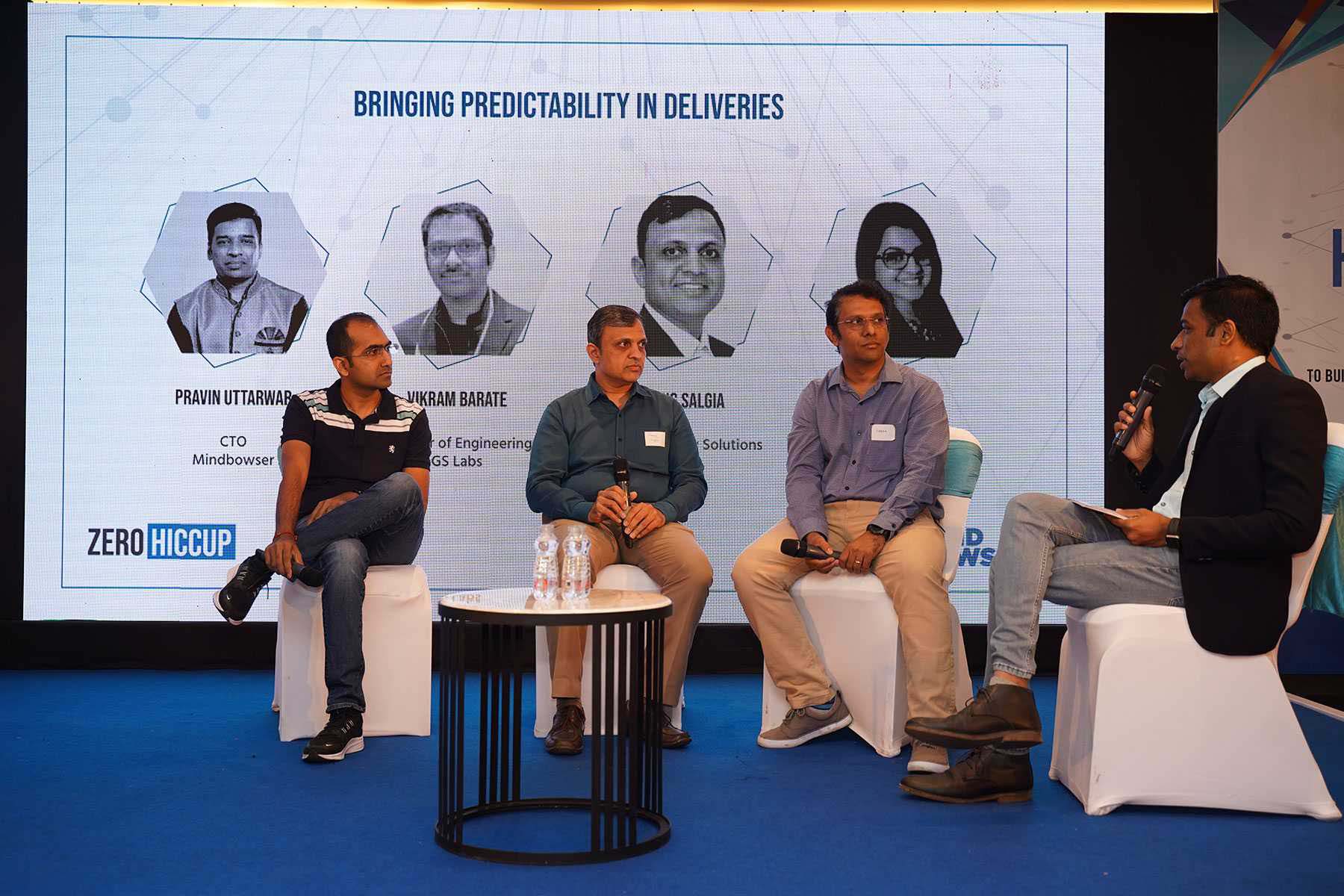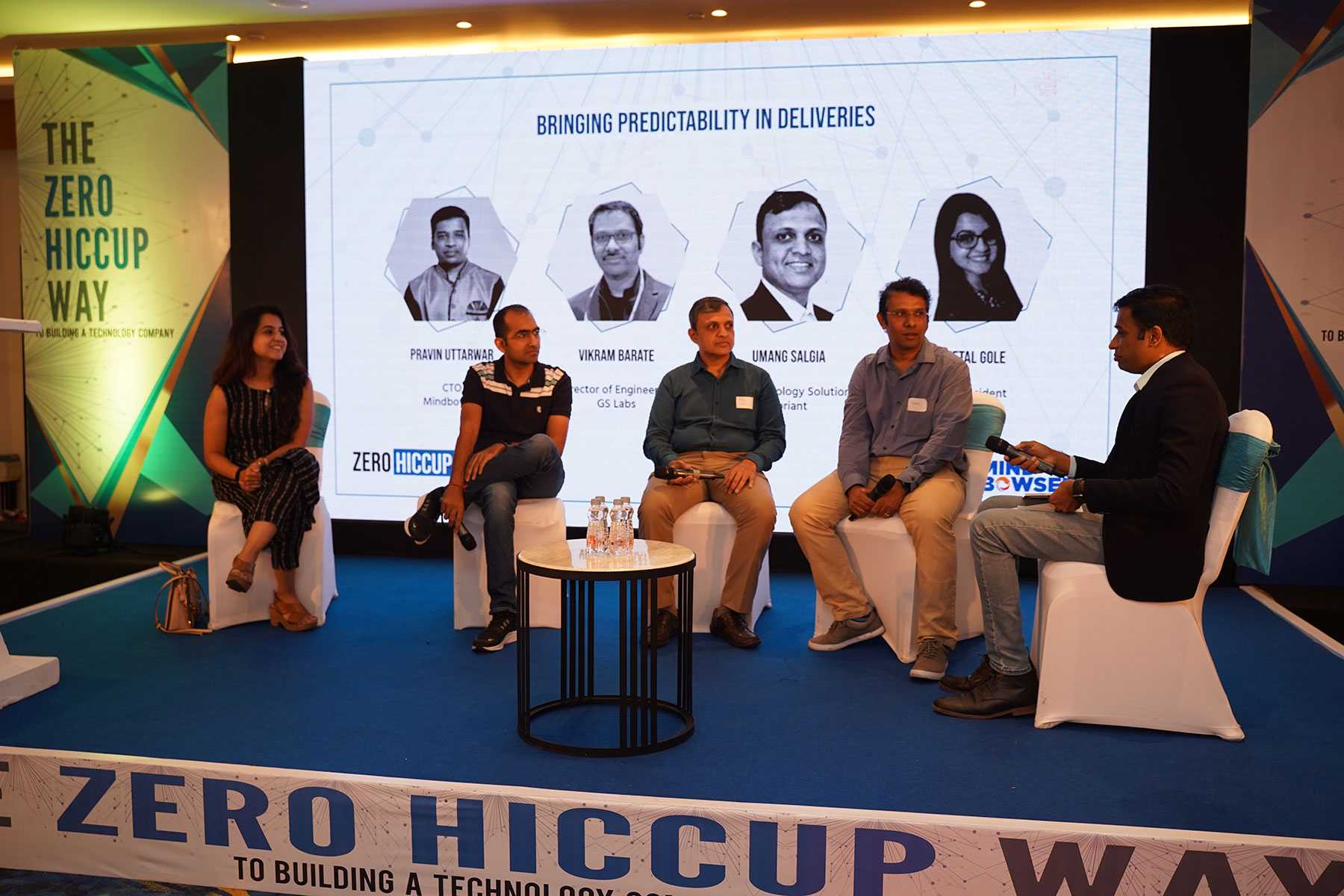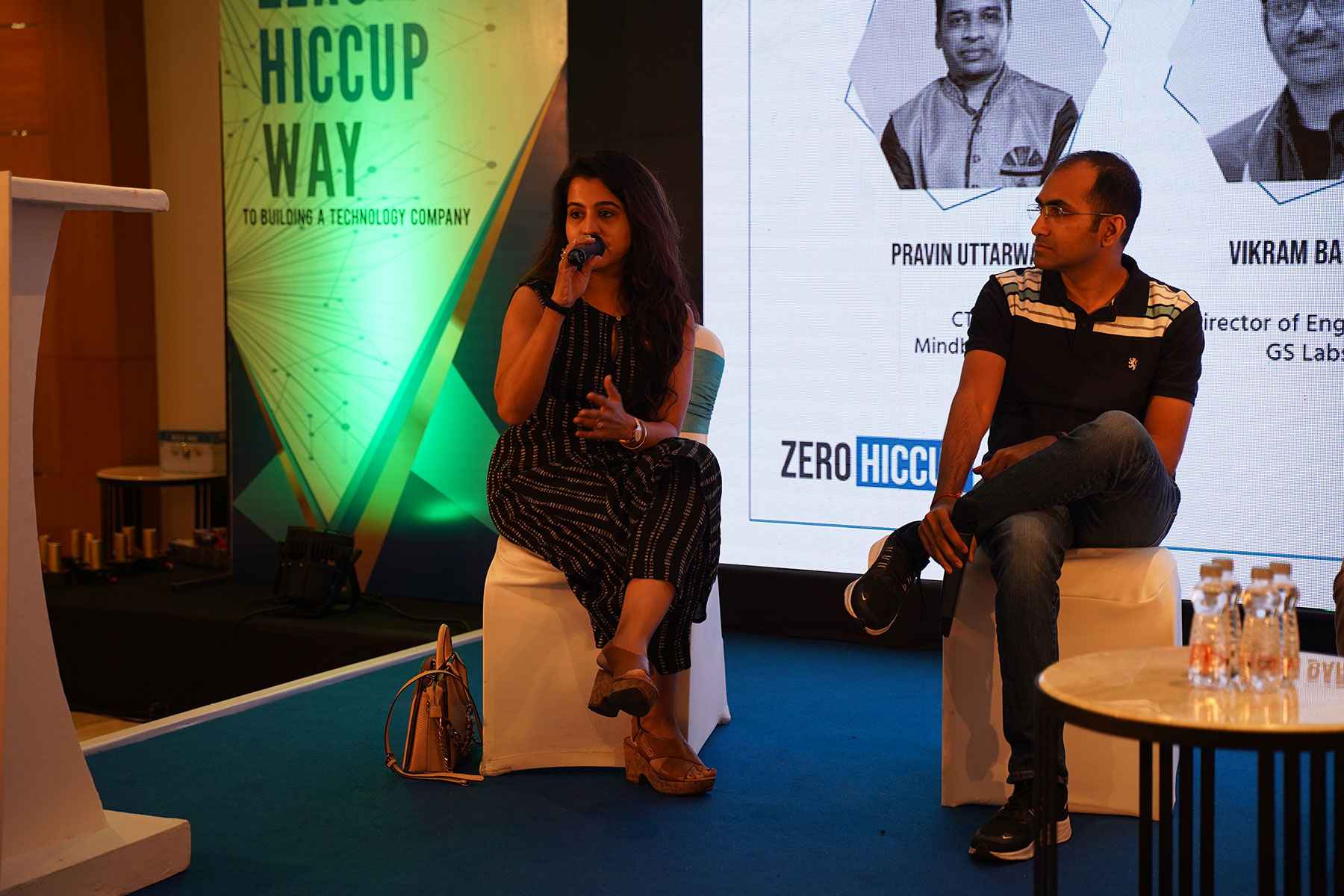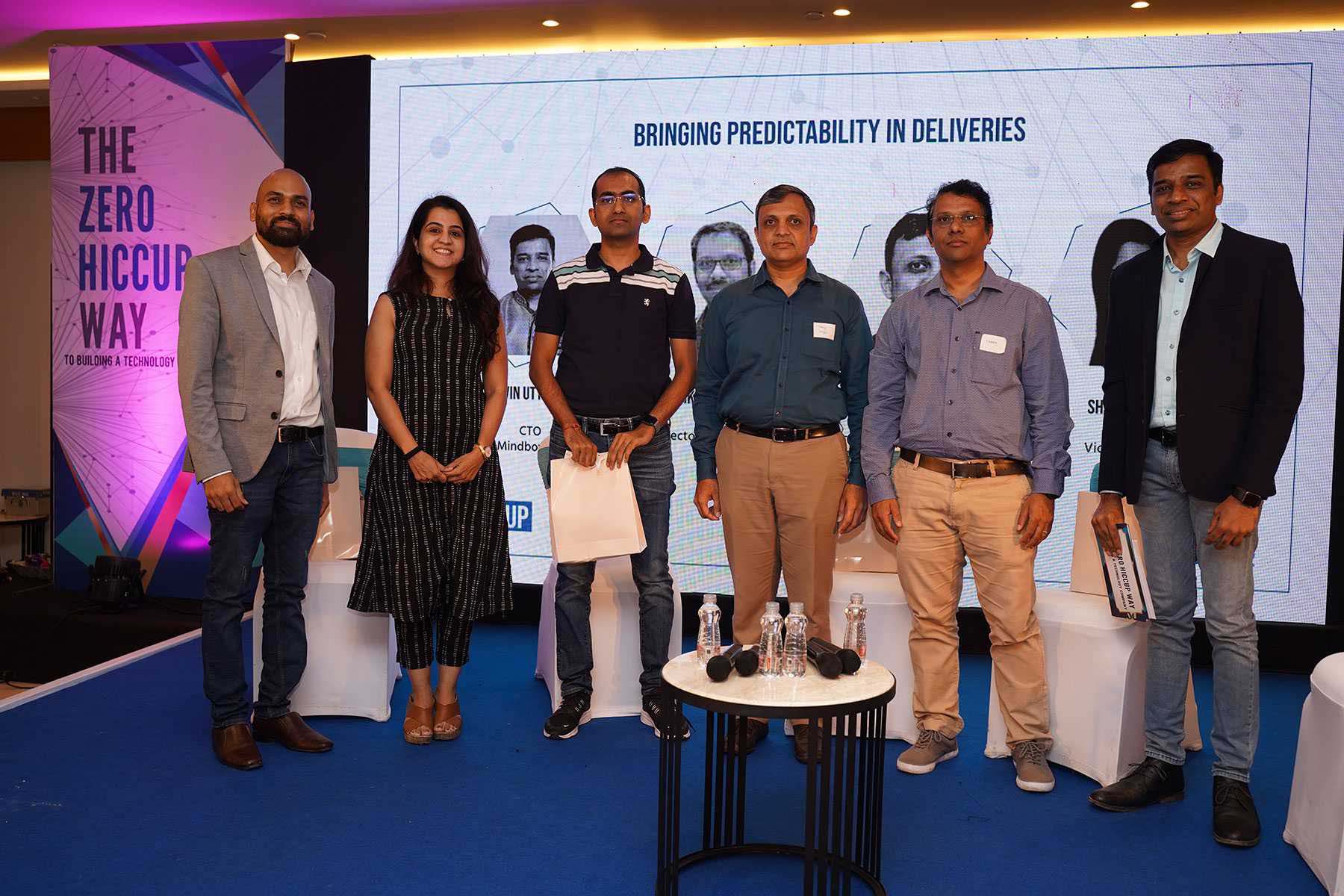This panel discussion was organized by Mindbowser. Inc
The focus of the discussion was to provide tips on how to make project deliveries more predictable.
The participating panelists were:
The panel discussion was moderated by Mr. Pravin Uttarwar. Pravin is a serial entrepreneur, tech geek and community builder. His goal is to help companies to set up their remote tech teams and scale quickly. He is the Co-Founder and CTO of MindBowser, an IT services and consulting company.




Background:
In technology development, one of the key problems that organizations are struggling with is delivering the product on time. Getting the right tech developed at the right time is consequential for founders riding in this age of digital transformation. Thus, predicting the deliverability and ensuring you achieve the deadlines are all the more important.
This interaction was held to understand how the industry leaders solve this problem at their level. They talk about the problems they face and the processes they have developed to bring predictability.
“A big challenge is that people do not try to understand the consumer’s needs. So don’t try to solve it just as a technological problem, but also solve it as a perception problem. Put yourself in their shoes. If you can think of a problem that could occur, you will have to go and address it so that you’re not leaving it for a chance. And that’s how you can ensure you set the right timelines and meet them”, Umang shared.
Umang replied, “At Xoriant, we do multiple things at all levels to set the right mindset and working culture. We have coaching programs in the organization at all levels starting from senior managers. We would like to say they are delivering a product and not providing a service. This empowers people to take responsibility for the product rather than consider it a service they are doing for someone else. The discipline and the mindset are what we should try to drive.
We also learn from the feedback we get from customers. Because delivery is also about consistency. If you get the same feedback twice, you must ensure you take some hard action.”
Vikram answered, “In GS labs, we always work as a trusted partner to our customers. If there is something we cannot do or something is not going according to plan, we always tell the customer upfront.
Even if the project gets delayed, we believe in transparency. And that transparency starts right from the start of the project. If some things can be done, cannot be done, if it is going to take time, do we have the required skill set, we try to put everything on the table.
And that not always goes into how much business we get, but if we focus on whether we are going to do any value addition, that results in more business.”
“Non-tech founders are a challenge because you cannot talk to them at an engineering level. Working with a VP of engineering, you need to have sprint plans, they want to be tightly involved. Non-tech founders want to see if you can solve my problem. They will talk at a very high level. They will talk about the business in their mind.
You will have to listen and then decode their requirements into the technical requirements and then convey it to your engineers. You will also have to give them a look and feel of what you’re developing for them. Let them play around with it as often as possible, as early as possible.” Umang said.
Related Read: Technical Terms Every Founder Needs To Know
Sheetal answered, “ Unknowns are the biggest ones which lessen your predictability. So, I think reducing the number of unknowns is important. At our company, we have a system where we label our stories as ready or not. This helps us track which still need work and which are ready to go.
Having a product backlog and Sprint with numerous stories is helpful, but not all of them require to be developed immediately. It’s necessary to prioritize the order in which these stories are tackled so that the product manager can focus on what’s most important.
And then we’ve got a bunch of things like the dependencies, a CSO angle to it, all the requirements put in, and all the stakeholders agreed to it. And all the KPIs sort of metrics that we track below it. It could just vary from application to application.
One way to ensure that everything is accounted for is by using a tool or system to help keep track of everything for you. This way, you can focus on other things and not worry much about forgetting something important.”

If you are a project manager or a tech company founder, you must make sure that you are finding and closing all the gaps in the processes. The Zero Hiccup Way is a book compiled by author Ayush Jain, who has intricately designed this book and poured all his decade-long knowledge and experience. Chapter 17, ‘Anatomy of a perfect software delivery‘ divulges and explores the topic of predictability and gives a perfect process to follow.
Bringing predictability to project delivery is not an easy task. It is a complex and multidimensional task, and several factors can affect predictability. However, the success of the project delivery can depend on how well you can predict the results.
The success of the project can depend on the predictability of the delivery. The more predictable the results are, the easier it is to manage them and plan accordingly.

We worked with Mindbowser on a design sprint, and their team did an awesome job. They really helped us shape the look and feel of our web app and gave us a clean, thoughtful design that our build team could...


The team at Mindbowser was highly professional, patient, and collaborative throughout our engagement. They struck the right balance between offering guidance and taking direction, which made the development process smooth. Although our project wasn’t related to healthcare, we clearly benefited...

Founder, Texas Ranch Security

Mindbowser played a crucial role in helping us bring everything together into a unified, cohesive product. Their commitment to industry-standard coding practices made an enormous difference, allowing developers to seamlessly transition in and out of the project without any confusion....

CEO, MarketsAI

I'm thrilled to be partnering with Mindbowser on our journey with TravelRite. The collaboration has been exceptional, and I’m truly grateful for the dedication and expertise the team has brought to the development process. Their commitment to our mission is...

Founder & CEO, TravelRite

The Mindbowser team's professionalism consistently impressed me. Their commitment to quality shone through in every aspect of the project. They truly went the extra mile, ensuring they understood our needs perfectly and were always willing to invest the time to...

CTO, New Day Therapeutics

I collaborated with Mindbowser for several years on a complex SaaS platform project. They took over a partially completed project and successfully transformed it into a fully functional and robust platform. Throughout the entire process, the quality of their work...

President, E.B. Carlson

Mindbowser and team are professional, talented and very responsive. They got us through a challenging situation with our IOT product successfully. They will be our go to dev team going forward.

Founder, Cascada

Amazing team to work with. Very responsive and very skilled in both front and backend engineering. Looking forward to our next project together.

Co-Founder, Emerge

The team is great to work with. Very professional, on task, and efficient.

Founder, PeriopMD

I can not express enough how pleased we are with the whole team. From the first call and meeting, they took our vision and ran with it. Communication was easy and everyone was flexible to our schedule. I’m excited to...

Founder, Seeke

We had very close go live timeline and Mindbowser team got us live a month before.

CEO, BuyNow WorldWide

If you want a team of great developers, I recommend them for the next project.

Founder, Teach Reach

Mindbowser built both iOS and Android apps for Mindworks, that have stood the test of time. 5 years later they still function quite beautifully. Their team always met their objectives and I'm very happy with the end result. Thank you!

Founder, Mindworks

Mindbowser has delivered a much better quality product than our previous tech vendors. Our product is stable and passed Well Architected Framework Review from AWS.

CEO, PurpleAnt

I am happy to share that we got USD 10k in cloud credits courtesy of our friends at Mindbowser. Thank you Pravin and Ayush, this means a lot to us.

CTO, Shortlist

Mindbowser is one of the reasons that our app is successful. These guys have been a great team.

Founder & CEO, MangoMirror

Kudos for all your hard work and diligence on the Telehealth platform project. You made it possible.

CEO, ThriveHealth

Mindbowser helped us build an awesome iOS app to bring balance to people’s lives.

CEO, SMILINGMIND

They were a very responsive team! Extremely easy to communicate and work with!

Founder & CEO, TotTech

We’ve had very little-to-no hiccups at all—it’s been a really pleasurable experience.

Co-Founder, TEAM8s

Mindbowser was very helpful with explaining the development process and started quickly on the project.

Executive Director of Product Development, Innovation Lab

The greatest benefit we got from Mindbowser is the expertise. Their team has developed apps in all different industries with all types of social proofs.

Co-Founder, Vesica

Mindbowser is professional, efficient and thorough.

Consultant, XPRIZE

Very committed, they create beautiful apps and are very benevolent. They have brilliant Ideas.

Founder, S.T.A.R.S of Wellness

Mindbowser was great; they listened to us a lot and helped us hone in on the actual idea of the app. They had put together fantastic wireframes for us.

Co-Founder, Flat Earth

Ayush was responsive and paired me with the best team member possible, to complete my complex vision and project. Could not be happier.

Founder, Child Life On Call

The team from Mindbowser stayed on task, asked the right questions, and completed the required tasks in a timely fashion! Strong work team!

CEO, SDOH2Health LLC

Mindbowser was easy to work with and hit the ground running, immediately feeling like part of our team.

CEO, Stealth Startup

Mindbowser was an excellent partner in developing my fitness app. They were patient, attentive, & understood my business needs. The end product exceeded my expectations. Thrilled to share it globally.

Owner, Phalanx

Mindbowser's expertise in tech, process & mobile development made them our choice for our app. The team was dedicated to the process & delivered high-quality features on time. They also gave valuable industry advice. Highly recommend them for app development...

Co-Founder, Fox&Fork
